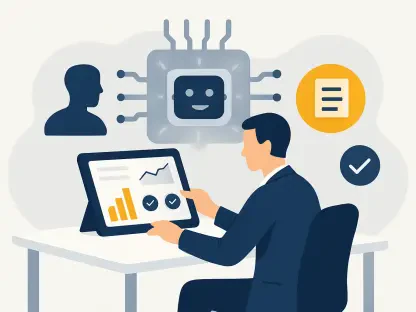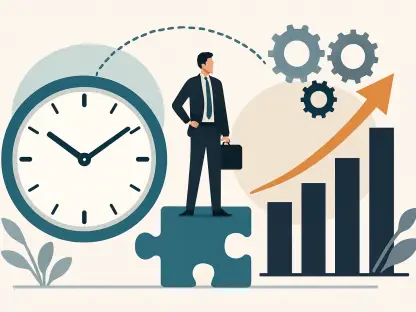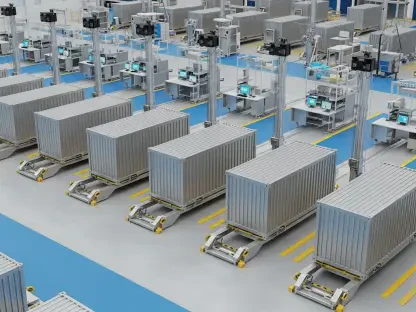The Middle East and North Africa (MEA) region is undergoing a seismic shift in digital transformation, fueled mainly by the rapid adoption of 5G technology. This next-generation network promises to redefine the digital landscape, offering unprecedented speed, connectivity, and opportunities for various industries.
The Adoption Surge: A Data-Driven Catalyst
Nokia’s research reveals that 60 percent of MEA communications service providers (CSPs) are embracing 5G technology. This is a remarkable statistic considering the varied socio-economic landscape of the region. By 2029, the MEA region anticipates 519 million 5G subscriptions, underscoring an era where nearly half of the total data traffic will be driven by 5G connections. Several factors contribute to this rapid adoption. Primarily, the need for enhanced connectivity and faster data speeds has become more pressing as digital transformation efforts intensify. Both urban and rural areas are experiencing increased demands for high-speed internet, which 5G meets efficiently. The potential for 5G to support myriad applications from smart cities to autonomous vehicles has not gone unnoticed, driving engagement from both public and private sectors.
Rapid digital transformation efforts require enhanced technological infrastructure, and 5G is stepping up to meet these demands. In urban areas, the main focus is often on smart city initiatives and IoT applications, whereas in rural locales, the necessity for improved connectivity ensures that no area is left behind. Besides meeting current demands, 5G also anticipates future needs, positioning the region to take full advantage of new technological frontiers. This wide-scale adoption is laying the groundwork for various sectors to innovate and improve operational efficiencies, making digital and economic advancements more accessible.
Gulf Cooperation Council Leading the Charge
The Gulf Cooperation Council (GCC) countries are at the forefront of this transformation within the MEA region. Nations such as the United Arab Emirates, Saudi Arabia, and Qatar are pivoting swiftly towards the deployment of 5G infrastructure. This sub-region is leveraging its economic capabilities and forward-thinking policies to outpace other areas in the adoption of this breakthrough technology. These countries view 5G as more than just an enhancement to existing network capabilities; they see it as a fundamental pillar for future economic growth. Leveraging 5G technology, the GCC is investing heavily in smart cities, e-governance, and enhanced healthcare and education systems. The integration of 5G in these sectors is anticipated to yield significant socio-economic benefits, reinforcing the region’s overall digital strategy.
GCC countries have identified 5G as central to their Vision 2030 frameworks, aiming to diversify their economies away from traditional oil dependencies. The rapid establishment of 5G infrastructure is helping these countries leapfrog into future-ready economies. Intelligent transport systems, virtual healthcare consultations, and smart grid technologies are becoming feasible on a large scale, thanks to 5G. Their proactive policy approach has led to expedited spectrum allocation and the establishment of regulations that facilitate the smooth deployment of 5G technology. Such initiatives resonate well with the national objectives of creating sustainable, knowledge-based economies, enabling the GCC to set a benchmark for the rest of the MEA region to follow.
Fixed Wireless Access: Expanding Horizons
A noteworthy aspect of the 5G rollout in the MEA region is the surge in Fixed Wireless Access (FWA). From accounting for just 11 percent of the market in 2022, FWA is expected to rise to 38 percent by 2029. This technology allows for wireless connections to serve fixed locations, such as homes and businesses, effectively bridging the digital divide in remote or underserved areas. FWA enables rapid deployment compared to traditional fiber optics, offering a cost-effective and scalable solution. It provides high-speed internet to areas where laying down cables is not economically viable, thus ensuring broader regional coverage. This expansion is poised to level the playing field, offering high-speed internet access to all, irrespective of geographical constraints.
The rise of FWA is transformative for regions struggling with the logistics and costs associated with laying conventional fiber-optic cables. For remote villages, FWA opens up avenues for digital education, telemedicine, and enhanced agricultural practices through IoT. Urban environments also benefit, especially in areas where digging up roads for fiber optics is impractical or cost-prohibitive. The scalability of FWA solutions ensures that high-speed connectivity can expand in tandem with increasing demand, making it a vital component of the region’s overall digital strategy. As FWA becomes more prevalent, it stands to significantly impact economic activities, elevating both individuals and businesses by offering reliable and faster internet access.
Implications for Enterprises: Enhanced Efficiency
The advent of 5G technology holds significant implications for business operations across the MEA region. Enhanced real-time data analytics, automation, and the ability to handle massive amounts of data are just a few advancements 5G brings. Businesses can streamline operations, reduce latency, and improve customer experiences, thus driving overall efficiency and productivity. For instance, the manufacturing sector stands to benefit immensely from the capabilities of 5G. High-speed, low-latency connections enable real-time monitoring and automation of production lines, reducing downtime and enhancing productivity. Similarly, in the logistics sector, 5G facilitates better tracking and management of supply chains, ensuring timely deliveries and efficient logistics operations.
The financial sector is another area set to be revolutionized by 5G technology. Real-time fraud detection, faster transactional speeds, and improved customer service through automated systems are just the tip of the iceberg. Retail businesses can also capitalize on augmented reality (AR) and virtual reality (VR) to create immersive shopping experiences, thereby increasing customer engagement. In the energy sector, smart grid technologies facilitated by 5G can optimize energy distributions and reduce waste. These enhancements spell a future where MEA enterprises are not just participants in the global economy, but innovators in their own right, maximizing efficiencies and pioneering new standards in their respective fields.
Consumer Benefits: Beyond Imagination
Consumers in the MEA region will experience a plethora of benefits from 5G technology. The promise of enhanced mobile internet speeds, smoother streaming, and real-time gaming is just the tip of the iceberg. The real impact lies in more transformative applications, such as augmented reality (AR) and virtual reality (VR) experiences, which become far more accessible and immersive with 5G. In healthcare, 5G can revolutionize telemedicine, allowing for real-time consultations and remote surgeries with minimal latency. Education can become more interactive and engaging through VR classrooms and remote learning platforms that 5G can readily support. As these technologies become mainstream, the quality of life for individuals across the MEA region is expected to improve significantly.
The potential for 5G to enhance public safety through real-time monitoring and emergency response systems offers another layer of consumer benefit. Think of smart homes equipped with enhanced security systems, real-time traffic updates, and immersive entertainment experiences all leveraged through a single robust network. Further, 5G stands to democratize access to innovative healthcare technologies, particularly in remote areas where healthcare facilities have traditionally been under-resourced. As these applications gain traction, they will transform everyday life, making advanced healthcare, education, and entertainment technologies accessible to a broader audience. The broad spectrum of 5G applications will offer direct and indirect consumer benefits, promoting overall societal growth and wellbeing.
Regulatory and Infrastructure Challenges
However, the journey to widespread 5G adoption is not without hurdles. Regulatory environments in various parts of the MEA region need to be agile and supportive to facilitate rapid deployment. Spectrum allocation, network security, and infrastructure investment are key areas that require coordinated efforts between governments and private stakeholders. In some areas, existing infrastructure may not be equipped to support the demand for 5G technology. These challenges necessitate substantial investment in network infrastructure, including the installation of new cell towers and the upgrading of existing ones. Furthermore, regulatory bodies must ensure smooth spectrum allocation to avoid interference and optimize network performance.
The existing regulatory frameworks in many MEA countries need modernization to keep pace with the rapid technological advancements 5G demands. Governments will need to adopt a more dynamic regulatory approach that fosters innovation while ensuring consumer and national security. Public-private partnerships can play a pivotal role in overcoming these challenges by pooling resources and expertise for the infrastructure build-out. Addressing these regulatory and infrastructural challenges is essential for unlocking the full potential of 5G technology in the region. Once these hurdles are overcome, the path will be clearer for deploying a connected ecosystem that supports socio-economic growth and innovation.
The Future Outlook: A Tech-Powered MEA
The Middle East and North Africa (MEA) region is experiencing a profound transformation driven by the swift implementation of 5G technology. This latest generation network is set to redefine the digital environment in numerous ways. Primarily, 5G brings unparalleled speed and connectivity, enabling quicker data transfer and more reliable mobile internet access.
Various industries within the MEA region stand to benefit immensely from this advancement. In healthcare, for instance, 5G can facilitate remote surgeries and real-time patient monitoring, boosting the overall quality of care. The education sector can also leverage faster internet speeds for more engaging and interactive online learning experiences, breaking down traditional barriers to knowledge.
Moreover, the rise of 5G is likely to spur innovation across sectors such as retail, with enhanced customer experiences through augmented reality, and smart cities, where everyday operations can be optimized for efficiency and sustainability. As the MEA region embraces this technological leap, industries will discover numerous opportunities for growth and modernization, fundamentally altering the way societies operate and connect.









